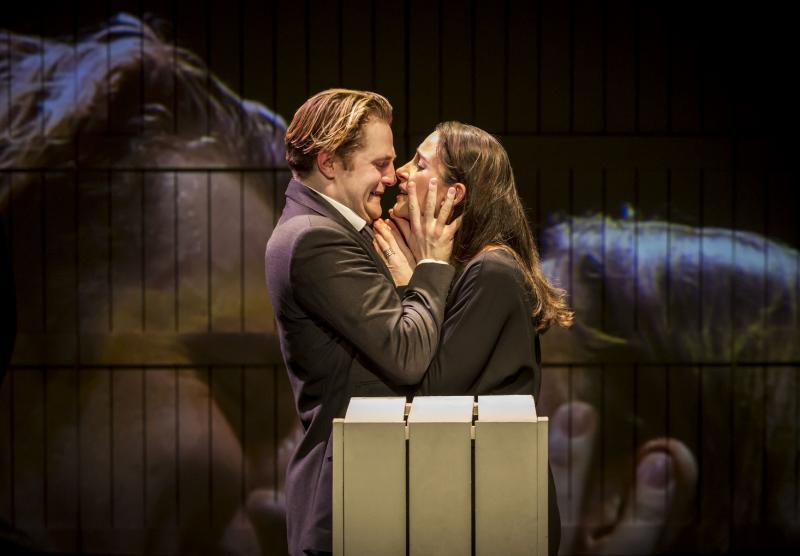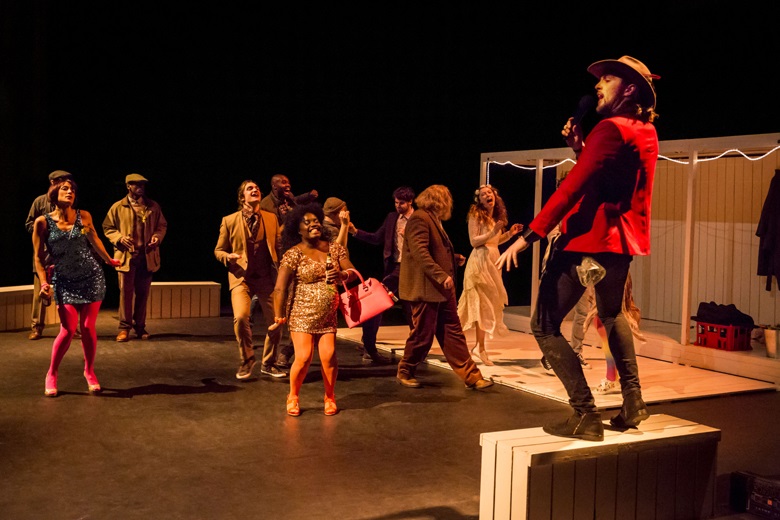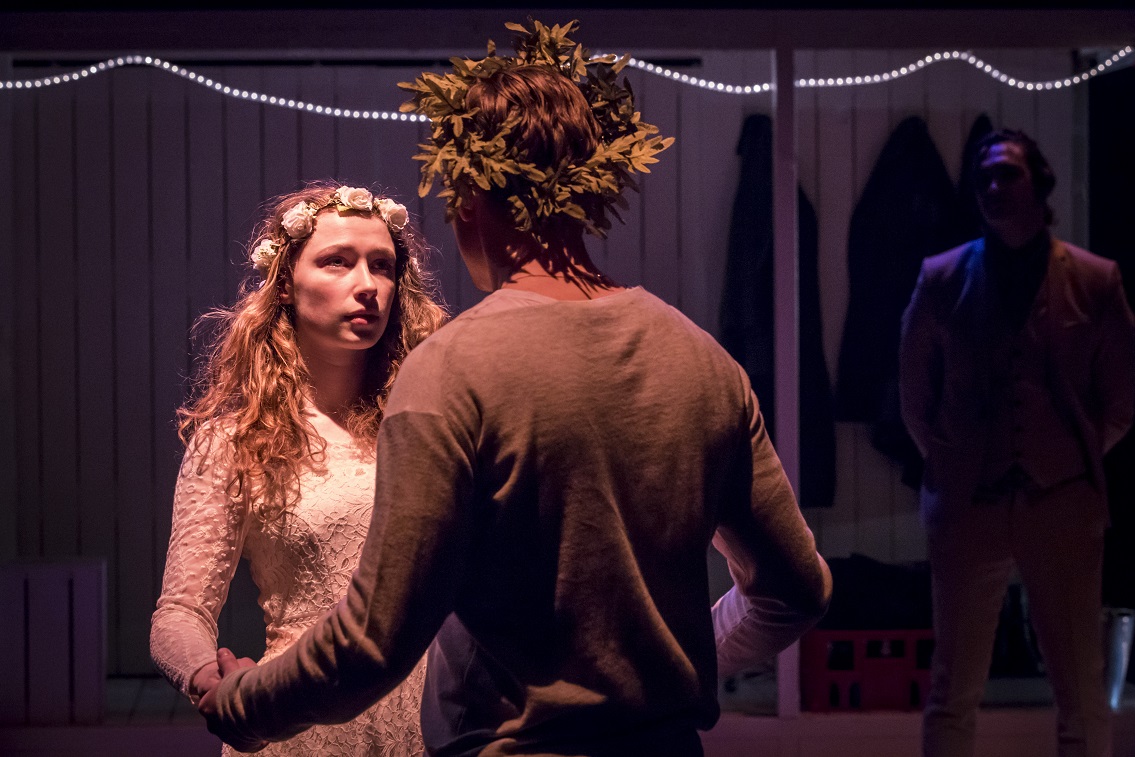The Winter's Tale, Barbican review - Cheek by Jowl's latest wavers in tone | reviews, news & interviews
The Winter's Tale, Barbican review - Cheek by Jowl's latest wavers in tone
The Winter's Tale, Barbican review - Cheek by Jowl's latest wavers in tone
A clear, considered production, but the updated comedy's uncertain

This is a well-travelled Winter’s Tale. Declan Donnellan has long been a director who's as much at home abroad as he is in the UK, and with co-production support here coming pronouncedly from Europe (there's American backing, too), Cheek by Jowl have made it abundantly clear where they stand on the issue of the day.
How much can you make of what’s essentially a wooden shack and a few benches? In Ormerod’s hands, the answer is a stunning variety of stage images. A bare wall, benches to the front, defines the opening action at the court of Sicilia; the proceedings of the judgement scene there are enlarged as back projections that give us the full, frightening lividness of Leontes’ face, and heighten the paranoid atmosphere. Moving to Bohemia, there are similar video images for the storm, then a recollection of Hermione (and the bear, of course). In the second half it flexes further, walls collapsing and realigned in all directions. It seems effortlessly easy (I’m sure it’s not), and completely natural. There’s a moment in Bohemia when the guests congregate for the country festivities that has them entering from the back of the stage, where a fine rain falls against rear lighting. It can’t last more than a minute – a detail that didn’t need to be there at all – and it’s exquisite.
Then Donnellan suddenly throws in something absolutely dire
Judith Greenwood’s lighting deserves special mention, too. She surely adds touches of green to the opening scene, which comes after Donnellan has given us a silent prologue, two figures in a dance – whether of conflict or closeness, we’re left to decide for ourselves. It has an easy-going, almost outdoor atmosphere, and what a young court this is: Leontes (Orlando James) is dressed down in jeans and an open shirt (the studied informality of new-style monarchy), while the stately beauty of Hermione (Natalie Radmall-Quirke) seems slowed, restrained by the obvious heaviness of her pregnancy.
Donnellan goes beyond the text to convince us of Leontes’ abrupt jealousy: as he soliloquises, the king circles Hermione and Polixenes (Edward Sayer), statically frozen on a bench, adjusting their poses. He literally images his imagined fears – a turn of the head here, a greater intimacy there – to bring his worst imagination to reality. It’s an inspired touch, as is the whopper of a tantrum thrown by Mamilius: his rage goes on and on, far beyond anything that might have prompted it, a child perhaps on the edge of the spectrum. But other thoughts come, too. Does Mamilius sense something of the awful disruption about to sunder all bonds of family and friendship? Or is he so much his father’s son that he’s accustomed to throwing his weight around, and getting away with it? Leontes’ extreme grief after the oracle’s revelation is similarly protracted.
 From this uneasy world, with its scuttling courtiers tail-coated like a posse of undertakers, the relief of Bohemia is palpable: this is life lived by the rhythms of eternity. The figure of Time that ushers us into the second half is a wild-child girl, Sixties King’s Road-style (Marianne Faithfull, anyone?). The simplicity of the shepherds is affectionate: we laugh with, rather than at them, even when the younger one has had to dictate his holiday shopping list on to his Walkman. He’s easy picking for Autolycus (Ryan Donaldson, pictured above, foreground), a figure who belongs here as much for his accomplishment as folk musician as for his trickery. The sense of assembling for the feast, and the naturalness of Eleanor McLoughlin’s flower ritual as Perdita (pictured below), is lovely. The social implications of the intrusion of Polixenes and Camillo are nicely caught by garbing them in parkas and dark glasses.
From this uneasy world, with its scuttling courtiers tail-coated like a posse of undertakers, the relief of Bohemia is palpable: this is life lived by the rhythms of eternity. The figure of Time that ushers us into the second half is a wild-child girl, Sixties King’s Road-style (Marianne Faithfull, anyone?). The simplicity of the shepherds is affectionate: we laugh with, rather than at them, even when the younger one has had to dictate his holiday shopping list on to his Walkman. He’s easy picking for Autolycus (Ryan Donaldson, pictured above, foreground), a figure who belongs here as much for his accomplishment as folk musician as for his trickery. The sense of assembling for the feast, and the naturalness of Eleanor McLoughlin’s flower ritual as Perdita (pictured below), is lovely. The social implications of the intrusion of Polixenes and Camillo are nicely caught by garbing them in parkas and dark glasses.
Then Donnellan suddenly throws in something absolutely dire: he gives Autolycus a TV show act – shades of Jeremy Kyle or Jerry Springer – complete with guying the front row, impotency jokes, and “let’s hear it from the rest of the family”. It feels like mining the very cheapest vein of comedy, and just out of place after the sheer clarity, textual and visual alike, of what has come before (and will come later). Donnellan follows it by transforming the shepherds’ departure for Sicilia into a nightmare airport inspection of luggage and documents – think, Easy Jet hitting immigration somewhere in Eastern Europe on a very bad day. It’s a raucous interlude, with a very cruel undertone too, which colours the mood. In short, a directorial intervention that works, in a way that the antics of Autolycus just don’t.
 From then on it feels like a sprint to the finish line (at a little over two and half hours, this is a Tale briskly told). Shakespeare’s telescoping of the reunion scene between the two erstwhile royal friends is reported like television correspondents doing their stand-ups back to the newsroom: that works, too. Finally, the resolution, radiant in its carefully posed stillness, which somehow never fails to move.
From then on it feels like a sprint to the finish line (at a little over two and half hours, this is a Tale briskly told). Shakespeare’s telescoping of the reunion scene between the two erstwhile royal friends is reported like television correspondents doing their stand-ups back to the newsroom: that works, too. Finally, the resolution, radiant in its carefully posed stillness, which somehow never fails to move.
And yet… Donnellan and Ormerod gave us their first Winter’s Tale 20 years ago, a Russian-language production for St Petersburg’s Maly Drama Theatre (Cheek by Jowl has since gone on to create some truly outstanding work with its Russian company). Its supreme insights took that one to places that this new version simply doesn’t reach. An impossible act to follow, perhaps, even though the ensemble playing here is of real quality, and there’s much to like in the show. The interpolation from Autolycus really does jar, though, and there's no getting around that.
rating
Share this article
The future of Arts Journalism
You can stop theartsdesk.com closing!
We urgently need financing to survive. Our fundraising drive has thus far raised £49,000 but we need to reach £100,000 or we will be forced to close. Please contribute here: https://gofund.me/c3f6033d
And if you can forward this information to anyone who might assist, we’d be grateful.

Subscribe to theartsdesk.com
Thank you for continuing to read our work on theartsdesk.com. For unlimited access to every article in its entirety, including our archive of more than 15,000 pieces, we're asking for £5 per month or £40 per year. We feel it's a very good deal, and hope you do too.
To take a subscription now simply click here.
And if you're looking for that extra gift for a friend or family member, why not treat them to a theartsdesk.com gift subscription?
more Theatre
 Tom at the Farm, Edinburgh Fringe 2025 review - desire and disgust
A visually stunning stage re-adaptation of a recent gay classic plunges the audience into blood and earth
Tom at the Farm, Edinburgh Fringe 2025 review - desire and disgust
A visually stunning stage re-adaptation of a recent gay classic plunges the audience into blood and earth
 Works and Days, Edinburgh International Festival 2025 review - jaw-dropping theatrical ambition
Nothing less than the history of human civilisation is the theme of FC Bergman's visually stunning show
Works and Days, Edinburgh International Festival 2025 review - jaw-dropping theatrical ambition
Nothing less than the history of human civilisation is the theme of FC Bergman's visually stunning show
 Every Brilliant Thing, @sohoplace review - return of the comedy about suicide that lifts the spirits
Lenny Henry is the ideal ringmaster for this exercise in audience participation
Every Brilliant Thing, @sohoplace review - return of the comedy about suicide that lifts the spirits
Lenny Henry is the ideal ringmaster for this exercise in audience participation
 Edinburgh Fringe 2025 reviews: The Beautiful Future is Coming / She's Behind You
A deft, epoch-straddling climate six-hander and a celebration (and take-down) of the pantomime dame at the Traverse Theatre
Edinburgh Fringe 2025 reviews: The Beautiful Future is Coming / She's Behind You
A deft, epoch-straddling climate six-hander and a celebration (and take-down) of the pantomime dame at the Traverse Theatre
 Good Night, Oscar, Barbican review - sad story of a Hollywood great's meltdown, with a dazzling turn by Sean Hayes
Oscar Levant is an ideal subject to refresh the debate about media freedom
Good Night, Oscar, Barbican review - sad story of a Hollywood great's meltdown, with a dazzling turn by Sean Hayes
Oscar Levant is an ideal subject to refresh the debate about media freedom
 Edinburgh Fringe 2025 reviews - Monstering the Rocketman by Henry Naylor / Alex Berr
Tabloid excess in the 1980s; gallows humour in reflections on life and death
Edinburgh Fringe 2025 reviews - Monstering the Rocketman by Henry Naylor / Alex Berr
Tabloid excess in the 1980s; gallows humour in reflections on life and death
 Edinburgh Fringe 2025 reviews: Lost Lear / Consumed
Twists in the tail bring revelations in two fine shows at the Traverse Theatre
Edinburgh Fringe 2025 reviews: Lost Lear / Consumed
Twists in the tail bring revelations in two fine shows at the Traverse Theatre
 Make It Happen, Edinburgh International Festival 2025 review - tutting at naughtiness
James Graham's dazzling comedy-drama on the rise and fall of RBS fails to snarl
Make It Happen, Edinburgh International Festival 2025 review - tutting at naughtiness
James Graham's dazzling comedy-drama on the rise and fall of RBS fails to snarl
 Edinburgh Fringe 2025 reviews: I'm Ready To Talk Now / RIFT
An intimate one-to-one encounter and an examination of brotherly love at the Traverse Theatre
Edinburgh Fringe 2025 reviews: I'm Ready To Talk Now / RIFT
An intimate one-to-one encounter and an examination of brotherly love at the Traverse Theatre
 Top Hat, Chichester Festival Theatre review - top spectacle but book tails off
Glitz and glamour in revived dance show based on Fred and Ginger's movie
Top Hat, Chichester Festival Theatre review - top spectacle but book tails off
Glitz and glamour in revived dance show based on Fred and Ginger's movie
 Edinburgh Fringe 2025 reviews: Alright Sunshine / K Mak at the Planetarium / PAINKILLERS
Three early Fringe theatre shows offer blissed-out beats, identity questions and powerful drama
Edinburgh Fringe 2025 reviews: Alright Sunshine / K Mak at the Planetarium / PAINKILLERS
Three early Fringe theatre shows offer blissed-out beats, identity questions and powerful drama
 The Daughter of Time, Charing Cross Theatre review - unfocused version of novel that cleared Richard III
The writer did impressive research but shouldn't have fleshed out Josephine Tey’s story
The Daughter of Time, Charing Cross Theatre review - unfocused version of novel that cleared Richard III
The writer did impressive research but shouldn't have fleshed out Josephine Tey’s story

Add comment